Text
DeFi 101: Understanding the Basics of Development
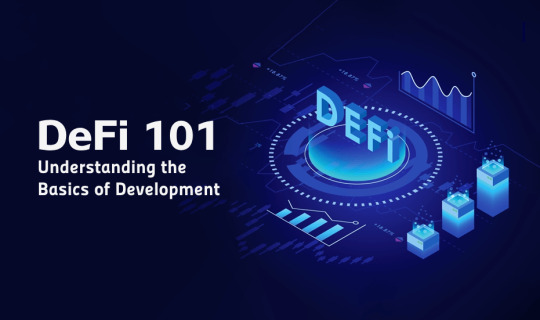
Welcome to our beginner's guide to DeFi development! In this article, we'll explore the fundamental concepts of decentralized finance (DeFi) and provide insights into how DeFi development companies are shaping the future of the financial industry.
What is DeFi?
DeFi, short for decentralized finance, refers to a blockchain-based financial system that operates without traditional intermediaries such as banks or brokerages. Instead, DeFi relies on smart contracts – self-executing contracts with the terms of the agreement directly written into code – to automate financial transactions and services.
Understanding DeFi Development
DeFi development involves creating and deploying smart contracts, protocols, and applications that enable various financial activities, including lending, borrowing, trading, and asset management, on decentralized platforms.
Key Components of DeFi Development
1. Smart Contracts:
These are the building blocks of DeFi applications, governing the rules and logic of financial transactions. Smart contracts execute automatically when predefined conditions are met, ensuring transparency and security.
2. Decentralized Exchanges (DEXs):
DEXs enable users to trade cryptocurrencies directly with one another without the need for intermediaries. These platforms provide liquidity pools and automated market-making algorithms to facilitate trading.
3. Lending and Borrowing Protocols:
DeFi lending platforms allow users to lend their assets to earn interest or borrow assets by collateralizing their holdings. These protocols are governed by smart contracts and enable users to access liquidity without traditional lenders.
4. Asset Management:
DeFi also offers solutions for asset management, including yield farming, staking, and liquidity mining. These strategies enable users to optimize returns on their crypto assets.
The Role of DeFi Development Companies
DeFi development companies play a crucial role in advancing the DeFi ecosystem by building innovative solutions and enhancing the security and usability of decentralized finance platforms. These companies provide:
- Expertise:
DeFi developers possess specialized skills in blockchain technology, smart contract development, and decentralized application (DApp) design.
- Security Audits:
DeFi development companies conduct comprehensive security audits to identify and mitigate vulnerabilities in smart contracts and protocols, ensuring the safety of users' funds.
- Custom Solutions:
They offer custom development services tailored to the unique requirements of clients, including white-label DeFi platforms, tokenization solutions, and integration with existing systems.
- Support and Maintenance:
DeFi development companies provide ongoing support and maintenance services to ensure the smooth operation of DeFi applications and platforms.
Conclusion
In conclusion, DeFi development is revolutionizing the financial industry by providing decentralized, transparent, and accessible alternatives to traditional finance. DeFi development companies play a vital role in driving innovation and shaping the future of finance through their expertise and custom solutions. As the DeFi ecosystem continues to evolve, these companies will remain at the forefront, building the infrastructure for a decentralized financial future.
If you're interested in exploring DeFi development further or looking to launch your own DeFi project, Clarisco is here to help. Contact us today to discuss your project requirements and discover how we can bring your DeFi vision to life.
0 notes
Text
https://www.clarisco.com/crypto-license-in-uk
Obtain Your Crypto License in the UK | Clarisco
Explore how to acquire a cryptocurrency license in the UK with Clarisco's expert guidance. Learn about the process, requirements, and benefits of obtaining a crypto license in the UK. Ensure compliance and legitimacy for your cryptocurrency business in one of the world's leading financial hubs.
0 notes
Text
Decentralized Finance (DeFi): Shaping the Future of the World Economy
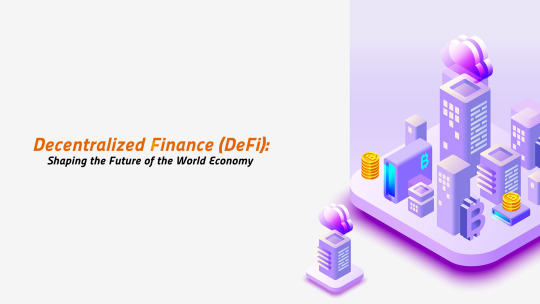
In recent years, Decentralized Finance (DeFi) has emerged as a groundbreaking force in the global financial landscape. With its promise of democratizing finance and eliminating intermediaries, DeFi has the potential to revolutionize how we transact, invest, and access financial services. As we look ahead, it's increasingly apparent that DeFi is not just a passing trend but rather the future of the world economy.
The Rise of DeFi
Traditional finance has long been dominated by centralized institutions like banks, which act as intermediaries in financial transactions. However, this centralized model is plagued by inefficiencies, high fees, and barriers to access for millions of people around the world. DeFi, built on blockchain technology, offers a decentralized alternative where financial services are accessible to anyone with an internet connection, regardless of their location or background.
Key Components of DeFi
At the heart of DeFi are smart contracts, which are self-executing contracts with predefined terms encoded directly into their underlying code. These smart contracts enable automated, trustless transactions, eliminating the need for intermediaries. Furthermore, decentralized exchanges (DEXs) allow users to trade assets directly with one another, without relying on a central authority to facilitate trade.
The Role of DeFi Development Companies
As the demand for DeFi solutions grows, so does the need for skilled development teams capable of building robust DeFi platforms and applications. DeFi development companies play a crucial role in this ecosystem, providing expertise in blockchain development, smart contract programming, and decentralized application (DApp) design.
A DeFi development company is responsible for creating innovative solutions that drive the evolution of decentralized finance. These companies offer a range of services, including:
1. Smart Contract Development:
Developing and auditing smart contracts to ensure they are secure, reliable, and free from vulnerabilities.
2. Decentralized Exchange Development:
Building decentralized exchanges that enable users to trade digital assets without the need for a centralized intermediary.
3. Wallet Integration:
Integrating secure cryptocurrency wallets into DeFi platforms to enable users to manage their funds safely.
4. Liquidity Solutions:
Providing liquidity solutions for DeFi projects to ensure efficient trading and borrowing.
5. Risk Management:
Implementing risk management protocols to mitigate the potential for smart contract exploits and financial losses.
Defi Development Solutions for a Decentralized Future
With the expertise and support of DeFi development solutions, the possibilities for innovation in decentralized finance are limitless. From decentralized lending and borrowing platforms to tokenization of real-world assets, DeFi has the potential to reshape every aspect of the global economy.
Some key areas where DeFi development solutions are making an impact include:
- Decentralized Lending: Platforms like Compound and Aave allow users to lend and borrow cryptocurrencies without the need for traditional banks.
- Stablecoins:
Stablecoins pegged to fiat currencies provide stability in the volatile cryptocurrency market, enabling seamless transactions and remittances.
- Decentralized Insurance:
Projects like Nexus Mutual create decentralized insurance platforms where users can obtain coverage for smart contract failures and other risks.
- Decentralized Identity:
Self-sovereign identity solutions based on blockchain technology offer users greater control over their data and identity.
The Future of DeFi
As DeFi matures, its impact on the world economy will only become more profound. By providing access to financial services for the unbanked, reducing transaction costs, and increasing financial inclusion, DeFi has the potential to uplift millions of people out of poverty and drive economic growth on a global scale.
In conclusion, DeFi is not just a fleeting trend but a transformative force reshaping the world economy's future. With the support of innovative DeFi development companies and the ongoing evolution of decentralized finance solutions, we are witnessing the dawn of a new era in finance one that is more inclusive, efficient, and equitable for all.
0 notes
Text
What makes a token project successful?
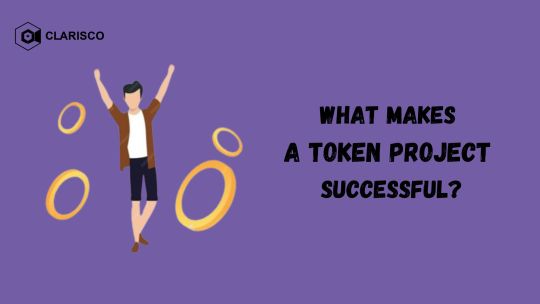
In the world of cryptocurrency and blockchain technology, just having a cool idea or fancy technology isn't enough to make a token project successful. Numerous things are there that need to be done right.
First, the project needs to have clear goals and plans for how its token will work (that's what we mean by "tokenomics"). Then, it needs to get people excited and involved in what it's doing (that's where community engagement comes in). And on top of all that, it needs to make sure it's following all the rules and regulations set by governments and authorities.
So, in this article, we are going to explore all the important things that make a crypto token project successful. And they're going to explain why it's really important to work with a good token development company that knows what they're doing when it comes to making tokens.
Robust Technology and Development Team
A strong and skilled team of developers is crucial for making a token project successful. They're the ones who bring the project to life by building a safe and reliable platform. Working with a good token development company can help ensure the project goes well. A reliable crypto token developer and team not only knows how to build a platform that's secure and can handle lots of users, but they also understand how blockchain technology works and can solve any tricky problems that come up.
Community Engagement and Transparency
Engaging with the community is also really important. That means talking to people on social media, forums, and at events. It's not just about keeping people up-to-date, though. It's also about listening to what they have to say and using their feedback to make the project better. Being open and honest about what's going on with the project is key too. It shows that the team is trustworthy and takes responsibility for what they're doing.
Getting lots of people to use the crypto token isn't easy. It's not enough to just have a good idea; the project needs to team up with other projects and companies in the industry. By working together, they can reach more people and grow faster. So, forming partnerships and collaborations with others is a big part of making a token project successful.
Continuous Innovation and Adaptability
Following the rules set by the government is important for any token project to do well. It's a bit like keeping up with the latest rules of a game – you need to know them to play properly. Working with a Crypto token development company that can deliver many token development projects that knows a lot about these rules can help avoid legal problems and make sure the project is on solid ground.
Keeping things fresh and coming up with new ideas is super important too. Just like how new inventions keep a company ahead of the game, staying innovative helps a token project stay ahead in the market. This means keeping up with new technologies and trends, so the project can keep being successful. Also, being able to change and adapt when the market changes is key for long-term success.
Conclusion:
In summary, the success of a token project depends on several factors, including having clear goals, a strong tokenomics plan, active community involvement, and following the rules. By teaming up with a trustworthy Crypto token development company and sticking to good practices, projects can improve their chances of success and leave a mark in the cryptocurrency world.
0 notes
Text
What are some examples of successful token projects?
In the world of cryptocurrency and blockchain, there's something called token projects. These are digital projects that are developed by crypto token development companies that use a special kind of technology called blockchain to create tokens. Tokens are like digital coins or assets that can represent ownership of something, like a piece of software or a digital collectible.
People create token projects to raise money, make decentralized apps (which are like computer programs that run on many computers at once), or create digital assets that can do different things. For example, some tokens might let you access a certain service, like a membership to a website, while others might be used to buy and sell digital goods, like virtual art.
So, in simple terms, token projects which are developed by token development companies that will be offering crypto token development services, are a way for people to make and use digital stuff using blockchain technology.
Ethereum (ETH)
Ethereum is like a big playground for creating digital stuff called tokens. It's famous for being the first place where people could easily make smart contracts, which are like digital contracts that automatically do what they're supposed to.
Lots of successful token projects have been born on Ethereum because it has strong technology and a lot of people using it. One popular type of crypto token on Ethereum is called ERC-20 tokens. These tokens follow certain rules set by Ethereum, which makes them work well with different wallets and places where you can trade tokens.
The perfect token development company will help and explain how to create a crypto token and launch it on a successful platform.
Binance Smart Chain (BSC)
Binance Smart Chain (BSC), launched by the popular cryptocurrency exchange Binance, has quickly gained traction as a viable alternative to Ethereum. Known for its low transaction fees and high throughput, BSC has attracted numerous token projects seeking scalability and cost-effectiveness. Projects on BSC commonly utilize BEP-20 tokens, which are analogous to Ethereum's ERC-20 tokens. Notable examples include decentralized exchanges (DEXs), yield farming platforms, and non-fungible token (NFT) marketplaces.
Polkadot:
Polkadot is known for its special way of connecting different blockchains so they can work together smoothly. This makes it easier for different blockchains, like Ethereum or Bitcoin, to talk to each other and share information.
In the world of Polkadot, successful token projects use its special structure called parachains to make their customized blockchains for specific purposes. These projects often come up with new and cool features, like making it easy for different blockchains to work together or making sure everything is super secure.
Cardano:
Cardano is a blockchain platform that's famous for being built based on scientific research. People are interested in it because it focuses on being able to handle lots of transactions, making sure it's sustainable in the long run, and being able to work well with other blockchains.
Token projects that do well on Cardano get to use its strong technology and the fact that it's based on research that's been checked by experts. Tokens made on Cardano have low fees for transactions and can handle lots of transactions at once, which makes them good for many different uses.
Conclusion:
In summary, successful token projects are crucial for driving innovation and adoption in the blockchain world. Nowadays, there are many crypto token development companies offering token development services evolved to make a perfect token since the crypto token development concept has become more popular.
0 notes
Text
How are new tokens distributed initially?
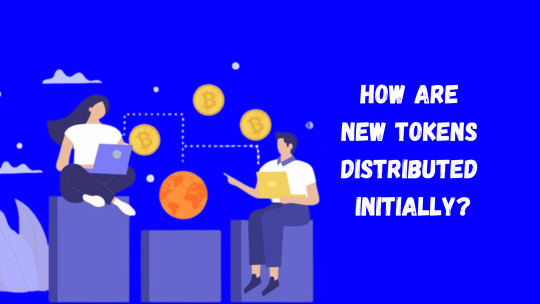
In the world of cryptocurrency, how new tokens are first given out is really important. It affects how the whole system works and how valuable the tokens become. Whether it's a brand new project making its own token or an existing blockchain creating a new digital currency, how they give out these new tokens at the beginning is key for making sure things are fair, decentralized, and involving the community. Let's take a look at the main ways,
Initial Coin Offering (ICO):
This used to be the most popular way to launch new tokens. In an ICO, the team behind the project sells some of the new tokens to early investors in exchange for other cryptocurrencies like Bitcoin or Ethereum. It was popular because it was easy and let projects raise money quickly. But ICOs got a lot of criticism because some turned out to be scams and they also got a lot of attention from regulators.
Token Pre-Sale:
Before the public ICO, projects often sell tokens at a lower price to a small group of investors, usually big institutions or people with a lot of money. This helps them get some funding before the big launch and also gets some important backers who might help the project grow.
Airdrops:
Airdrops are when tokens are given out for free to people who already have other cryptocurrencies or are part of certain groups. They do this to get more people involved, make the tokens more popular, and reward the ones who joined in early. Airdrops can happen in different ways, like suddenly giving out tokens, giving them to people who complete certain tasks, or targeting people who already have certain tokens.
Initial DEX Offering (IDO):
This is like a newer version of ICOs, but it happens on decentralized exchanges (DEXs) instead of through a company. It's more open, transparent, and harder to control. People can use their crypto wallets directly to buy new tokens.
Staking and Yield Farming:
Token development companies often include staking or yield farming features in new token projects. Staking means locking up tokens in a smart contract to help keep the network secure, and in return, people get more tokens as rewards. Yield farming encourages people to add money to decentralized exchanges or lending platforms by giving them more tokens as rewards.
Community Grants and Rewards:
Projects set aside some tokens for things like supporting developers, finding bugs, or encouraging people to participate. This can include things like giving tokens to developers, rewarding people who help with liquidity, or letting the community vote on how tokens are distributed. It's about getting everyone involved and making sure people feel like they're part of the project's success. By collaborating with token development companies, projects can leverage their experience and resources to design and implement targeted programs that incentivize active participation and contribute to the long-term growth and sustainability of the ecosystem
Conclusion:
In conclusion, when it comes to giving out new tokens for the first time, there are lots of different ways to do it. These methods are chosen based on what the goal is, like raising money, getting people involved, making the network safe, and spreading out control. There are many Crypto token development companies that play a vital role in suggesting how these tokens are first given out.
0 notes
Text
How are new tokens distributed initially?
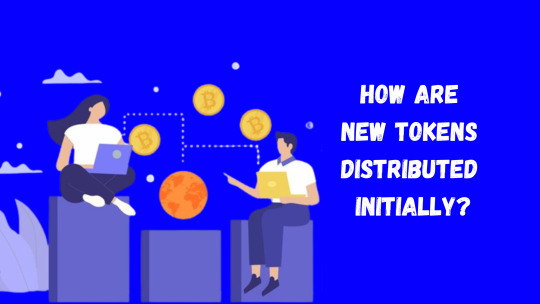
In the world of cryptocurrency, how new tokens are first given out is really important. It affects how the whole system works and how valuable the tokens become. Whether it's a brand new project making its own token or an existing blockchain creating a new digital currency, how they give out these new tokens at the beginning is key for making sure things are fair, decentralized, and involving the community. Let's take a look at the main ways,
Initial Coin Offering (ICO):
This used to be the most popular way to launch new tokens. In an ICO, the team behind the project sells some of the new tokens to early investors in exchange for other cryptocurrencies like Bitcoin or Ethereum. It was popular because it was easy and let projects raise money quickly. But ICOs got a lot of criticism because some turned out to be scams and they also got a lot of attention from regulators.
Token Pre-Sale:
Before the public ICO, projects often sell tokens at a lower price to a small group of investors, usually big institutions or people with a lot of money. This helps them get some funding before the big launch and also gets some important backers who might help the project grow.
Airdrops:
Airdrops are when tokens are given out for free to people who already have other cryptocurrencies or are part of certain groups. They do this to get more people involved, make the tokens more popular, and reward the ones who joined in early. Airdrops can happen in different ways, like suddenly giving out tokens, giving them to people who complete certain tasks, or targeting people who already have certain tokens.
Initial DEX Offering (IDO):
This is like a newer version of ICOs, but it happens on decentralized exchanges (DEXs) instead of through a company. It's more open, transparent, and harder to control. People can use their crypto wallets directly to buy new tokens.
Staking and Yield Farming:
Token development companies often include staking or yield farming features in new token projects. Staking means locking up tokens in a smart contract to help keep the network secure, and in return, people get more tokens as rewards. Yield farming encourages people to add money to decentralized exchanges or lending platforms by giving them more tokens as rewards.
Community Grants and Rewards:
Projects set aside some tokens for things like supporting developers, finding bugs, or encouraging people to participate. This can include things like giving tokens to developers, rewarding people who help with liquidity, or letting the community vote on how tokens are distributed. It's about getting everyone involved and making sure people feel like they're part of the project's success. By collaborating with token development companies, projects can leverage their experience and resources to design and implement targeted programs that incentivize active participation and contribute to the long-term growth and sustainability of the ecosystem
Conclusion:
In conclusion, when it comes to giving out new tokens for the first time, there are lots of different ways to do it. These methods are chosen based on what the goal is, like raising money, getting people involved, making the network safe, and spreading out control. There are many Crypto token development companies that play a vital role in suggesting how these tokens are first given out.
0 notes
Text
What industries can benefit from smart contracts and tokenization?
In today's world where everything is digital, blockchain technology has become a big deal. It's like a special tool that helps create new and clever solutions in different areas like banking, healthcare, and more.
Two important things that blockchain does are "smart contracts" and "tokenization." Smart contracts are like super-smart agreements that run independently without needing people to ensure they're followed. Tokenization is about turning real-world things, like property or money, into digital tokens that can be easily traded or used online.
So, with blockchain, businesses can make things work smoother, keep stuff safer, and even find new ways to make money. It's like giving them a powerful new tool to make life easier and more efficient in lots of different ways.
What Industries Can Benefit?
1. Real Estate Industry:
With smart contracts, property transactions like buying, selling, and renting can happen automatically without much manual effort. Tokenization allows properties to be split into digital shares, making real estate investment more accessible to more people. This means lower costs, faster transactions, and easier trading of property shares.
2. Finance and Banking Sector: Smart contracts can automate financial agreements like loans and insurance, cutting out the middlemen and reducing the chances of fraud. Tokenization lets assets like stocks and bonds be divided into smaller digital pieces, making trading and ownership transfers smoother and faster.
3. Supply Chain Management: Blockchain-powered smart contracts improve trust and transparency in supply chains by recording transactions securely. Tokenization helps track goods in real time, reducing the risk of counterfeit products and making supply chains more efficient and responsive to changes.
4. Healthcare Sector: Blockchain-based smart contracts ensure the security and privacy of patient data by storing it securely and allowing controlled access. Tokenization of medical records helps maintain privacy while making data sharing easier among authorized parties. Automated billing and claims processing also become more efficient.
5. Entertainment and Media: Smart contracts and tokenization address issues like piracy and fair compensation for creators. By tokenizing digital assets like music and movies, creators can control their work and ensure fair payments through automated royalty distributions. This also helps track ownership and usage rights transparently, reducing disputes and building trust among creators and consumers. Smart contracts also enable transparent and immutable records of ownership and usage rights, reducing disputes and increasing trust among creators, distributors, and consumers.
Conclusion:
Smart contracts and tokenization can change how different industries work, making things smoother, and safer, and creating new chances to make money. Whether it's real estate, finance, supply chain, or healthcare, companies can use blockchain to improve their operations, more transparent, and more trusted.
By working with a company that helps develop tokens, businesses can figure out how to use blockchain and get all the good stuff it offers. A crypto token development company plays a crucial role in implementing smart contracts and tokenization solutions for businesses across various industries. Whether it's tokenizing real estate properties, digitizing financial assets, or enhancing supply chain transparency, a token development company can provide the technical expertise and resources needed to implement blockchain solutions effectively.
0 notes
Text
How Smart Contracts Contribute to Tokenization

Tokenization, the process of converting real-world assets into digital tokens, has gained significant traction in recent years, thanks to blockchain technology. At the heart of tokenization lies smart contracts, which play a crucial role in facilitating the creation, management, and exchange of digital assets.
In this blog post, we'll explore how smart contracts contribute to tokenization and why they are essential for any crypto token development company.
1. Automation of Transactions
Smart contracts automate transactions by executing predefined instructions when certain conditions are met. In the context of tokenization, smart contracts can handle the issuance, transfer, and redemption of tokens without the need for intermediaries. This automation streamlines the tokenization process, reduces transaction costs, and ensures transparency and efficiency in asset management.
2. Security and Immutability
Smart contracts are deployed on blockchain networks, making them immutable and tamper-proof. Once a smart contract is deployed, its code cannot be altered, providing security and trust to participants in the tokenization process. This ensures that token holders have full control over their assets and eliminates the risk of fraudulent activities or unauthorized changes to the token's properties.
3. Programmable Rules and Conditions
Smart contracts enable token developers to define programmable rules and conditions governing the behavior of their tokens. These rules can include restrictions on token transfers, compliance with regulatory requirements, and mechanisms for handling disputes or resolving conflicts. By embedding these rules into smart contracts, token developers can ensure that their tokens operate according to predefined parameters, enhancing the integrity and reliability of the tokenized assets.
4. Transparent and Auditable Transactions
Blockchain technology provides transparency and immutability to token transactions, allowing participants to trace the entire transaction history of a token back to its origin. Smart contracts facilitate this transparency by recording all token transactions on the blockchain in a secure and verifiable manner. This transparency enables auditors, regulators, and token holders to verify the authenticity and ownership of tokenized assets, thereby building trust and confidence in the tokenization process.
5. Decentralized Governance
Many tokenized assets operate under decentralized governance models, where token holders have a say in the decision-making process through voting mechanisms embedded in smart contracts. Smart contracts enable the implementation of governance protocols that allow token holders to vote on key decisions such as protocol upgrades, asset management strategies, and distribution of rewards. This decentralized governance ensures that the interests of token holders are represented and protects the integrity of the tokenized ecosystem.
Conclusion
In conclusion, smart contracts are instrumental in facilitating tokenization by automating transactions, providing security and immutability, defining programmable rules, ensuring transparency and audibility, and enabling decentralized governance. For any token development company, understanding the role of smart contracts in tokenization is essential for creating robust, secure, and compliant tokenized assets. By harnessing the power of smart contracts, token developers can unlock new opportunities for innovation, efficiency, and inclusivity in the digital economy.
0 notes
Text
Mastering Play-to-Earn: The Journey of Game Development
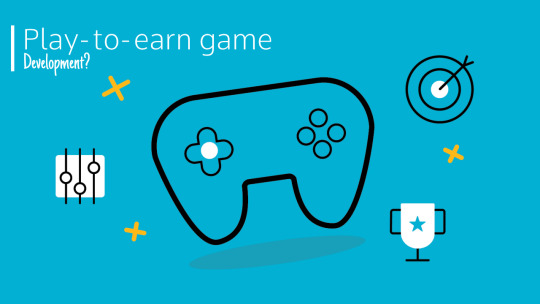
In the ever-evolving landscape of gaming, Play-to-Earn (P2E) has emerged as a revolutionary concept. Gone are the days when players simply enjoyed games for entertainment; now, they can earn real-world rewards while playing. This paradigm shift has opened up new opportunities for both gamers and developers alike.
As a leading Play-to-Earn game development company, we understand the intricacies of this exciting journey. Let's delve into the process of mastering P2E game development and explore how it's reshaping the gaming industry.
Understanding Play-to-Earn
Play-to-earn games allow players to earn cryptocurrency or other digital assets by participating in various in-game activities. This can include completing quests, winning battles, owning virtual assets, and more. The concept has gained immense popularity due to its potential for financial empowerment and the ability to create truly decentralized gaming ecosystems.
The Evolution of Game Development
Traditional game development focuses on creating immersive experiences for players, but P2E game development goes a step further by integrating blockchain technology. This enables secure asset ownership, transparent transactions, and decentralized governance within the game environment.
Key Components of P2E Game Development
1. Blockchain Integration:
Implementing blockchain technology ensures transparency, security, and immutability of in-game assets and transactions. Smart contracts govern the rules and mechanics of the game, providing players with trust and confidence in the ecosystem.
2. Economic Design:
Balancing in-game economies is crucial in P2E games to maintain a fair and sustainable environment. Game developers must carefully design reward systems, tokenomics, and scarcity of assets to incentivize participation while preventing inflation and exploitation.
3. Gameplay Mechanics:
Engaging gameplay is essential to keep players hooked and motivated to continue playing. P2E games often incorporate strategy, competition, and social interaction elements to create compelling experiences.
4. Community Building:
Building a strong community around the game is vital for its success. This involves fostering player engagement, organizing events, providing support, and listening to feedback to improve the gaming experience continuously.
Challenges and Opportunities
While P2E game development presents exciting opportunities, it also comes with its own set of challenges. Technical complexities, regulatory compliance, scalability issues, and user adoption are some of the hurdles that developers may face. However, overcoming these challenges can lead to groundbreaking innovations and lucrative rewards.
The Future of Play-to-Earn
As the Play-to-Earn trend continues to gain momentum, we can expect to see a proliferation of innovative games and platforms. From virtual worlds and metaverses to competitive esports and beyond, the possibilities are endless. As a leading Play-to-Earn game development company, we're committed to pushing the boundaries of what's possible and shaping the future of gaming.
In conclusion, mastering Play-to-Earn game development is a journey filled with creativity, innovation, and opportunity. By harnessing the power of blockchain technology and designing captivating experiences, developers can unlock the full potential of this transformative gaming paradigm. Join us as we embark on this exciting adventure and redefine the way we play, earn, and interact in virtual worlds.
0 notes
Text
How can blockchain technology improve play-to-earn games?
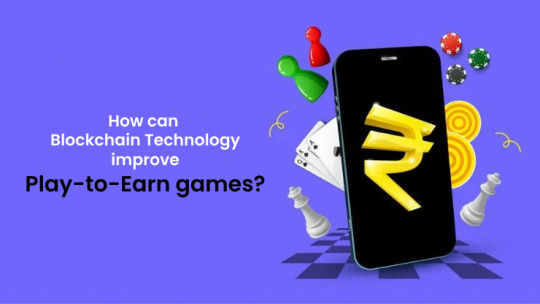
In recent years, blockchain technology has emerged as a game-changer for various industries, and gaming is no exception. Play-to-earn (P2E) games, which allow players to earn rewards in the form of cryptocurrency or digital assets, have gained significant traction. Blockchain technology can further enhance the experience of play-to-earn games, offering new opportunities for players and developers alike. Let's explore how blockchain technology can revolutionize P2E games.
What Are Play-to-Earn Games?
Play-to-earn games, as the name suggests, enable players to earn rewards by engaging with the game's ecosystem. These rewards can include cryptocurrencies, non-fungible tokens (NFTs), in-game items, or other digital assets. Unlike traditional games where rewards are often limited to in-game progress, P2E games provide tangible value that players can trade, sell, or use outside of the game environment.
Leveraging Blockchain in P2E Games
1. Ownership and Scarcity:
Blockchain technology enables true ownership of in-game assets through the use of NFTs. In P2E games, players can truly own their digital items, which are recorded on the blockchain. This ownership creates scarcity and value, as these assets cannot be duplicated or manipulated by developers.
2. Transparent Economy:
Blockchain provides transparency to the in-game economy by recording all transactions on a public ledger. Players can easily verify the scarcity and authenticity of in-game assets, ensuring a fair and transparent gaming experience.
3. Interoperability:
Blockchain allows for interoperability between different games and platforms. Players can use their earned assets across multiple games or even trade them on decentralized marketplaces. This opens up new possibilities for cross-game collaboration and asset utilization.
4. Decentralized Governance:
Some blockchain-based P2E games incorporate decentralized governance mechanisms, allowing players to participate in the decision-making process. Through voting or staking mechanisms, players can have a say in the development direction of the game, fostering a sense of community and ownership.
5. Monetization Opportunities for Developers:
Blockchain technology enables new monetization models for game developers. Instead of relying solely on traditional revenue streams like in-game purchases or advertising, developers can generate revenue through token sales, royalties from asset trading, or other innovative mechanisms.
Play-to-Earn Game Development Services
For developers looking to capitalize on the potential of blockchain in P2E games, specialized play-to-earn game development services offer tailored solutions. These services typically include:
- Smart Contract Development:
Creating smart contracts to manage in-game assets, transactions, and governance mechanisms.
- Integration with Blockchain Platforms:
Integrating the game with blockchain platforms like Ethereum, Binance Smart Chain, or Flow to enable asset ownership and transactions.
- NFT Minting and Management:
Developing tools for minting and managing NFTs representing in-game assets.
- Community Building:
Building and nurturing a community of players and stakeholders through social media, forums, and other channels.
- Economic Design:
Designing the in-game economy and reward mechanisms to ensure balance, fairness, and sustainability.
Conclusion
Blockchain technology has the potential to revolutionize play-to-earn games by providing true ownership, transparency, interoperability, decentralized governance, and new monetization opportunities. As the popularity of P2E games continues to grow, developers and players alike stand to benefit from the innovative capabilities of blockchain technology.
For those interested in developing play-to-earn games or exploring the possibilities of blockchain in gaming, specialized play-to-earn game development services offer the expertise and support needed to bring these ideas to life.
Looking to create your own play-to-earn game? Our play-to-earn game development services can help you harness the power of blockchain technology to create immersive and rewarding gaming experiences.
Contact us today to learn more about how we can bring your vision to reality!
0 notes
Text
Maximizing Your Earnings: How Much Can You Earn Per Hour Playing Crypto Games?
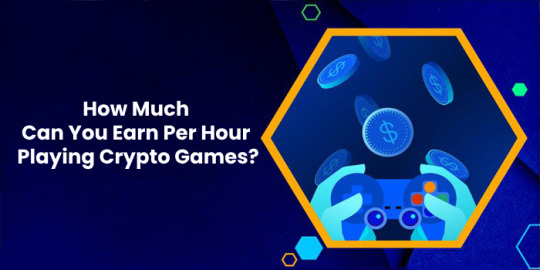
In recent years, the gaming landscape has been revolutionized by blockchain technology. Blockchain games, which utilize cryptocurrencies and decentralized platforms, have introduced new avenues for players to earn money while enjoying themselves.
Many are now curious about the earning potential of playing crypto games: How much can you earn per hour?
The answer to this question depends on various factors, including the game, your skill level, and market conditions. Let's delve into crypto gaming to understand its earning dynamics.
Understanding Blockchain Games
Blockchain games are built on decentralized networks like Ethereum, allowing players to own and trade in-game assets as non-fungible tokens (NFTs). These assets hold real-world value and can be bought, sold, or exchanged outside of the game.
Players can earn cryptocurrency rewards by participating in different in-game activities, such as completing quests, battling opponents, or trading virtual assets on decentralized marketplaces.
Factors Affecting Earnings
1. Game Mechanics:
Each game has its earning mechanisms. Some games reward players for completing tasks or reaching in-game goals, while others offer rewards based on performance in player-versus-player (PvP) battles or tournaments.
2. Skill Level:
Skill is crucial for maximizing earnings. Players with better strategies, reflexes, or expertise often earn more rewards within the game.
3. Market Conditions:
The value of in-game assets and cryptocurrencies can fluctuate based on market demand and other external factors. Consequently, players may see variations in their earnings.
4. Time Invested:
Like any activity, the more time you invest, the more you can potentially earn. Players who dedicate more time to playing and engaging with the game are likely to see higher rewards.
Maximizing Earnings
To maximize earnings while playing crypto games, consider these strategies:
1. Choose Wisely:
Research different blockchain games and select those that match your interests and skills. Look for games that offer multiple earning opportunities and have an active player base.
2. Improve Skills:
Practice and improve your gaming skills to increase your chances of winning battles or completing tasks efficiently. Engaging with gaming communities or forums can provide valuable insights and tips.
3. Stay Informed:
Keep up to date with market trends, game updates, and upcoming events within the gaming community. Being proactive can help you seize earning opportunities.
4. Diversify:
Instead of relying solely on one game, diversify your gaming portfolio. Explore different games and platforms to spread your risk and maximize overall earnings potential.
Conclusion
While it's challenging to provide a specific earning figure for playing crypto games, the potential for earning is significant. With the right strategy, dedication, and a bit of luck, players can earn a substantial income through blockchain gaming.
As the blockchain gaming industry continues to evolve, more earning opportunities are likely to emerge. Whether you're a casual gamer looking to earn extra income or a dedicated enthusiast aiming to turn gaming into a profession, the world of crypto games offers exciting possibilities.
For those interested in exploring blockchain gaming further, we offer specialized blockchain game development services. Our team creates immersive and rewarding gaming experiences on the blockchain, empowering players to earn while they play.
Contact us today to learn more!
0 notes
Text
Building an Advanced DeFi Platform: A Comprehensive Guide

Decentralized Finance (DeFi) has emerged as one of the most promising sectors within the blockchain industry, offering innovative financial services without the need for traditional intermediaries. Developing an advanced DeFi platform requires a deep understanding of blockchain technology, smart contracts, and user requirements.
In this guide, we'll explore the key steps and considerations involved in creating an advanced DeFi platform development with the assistance of a specialized DeFi development company.
1. Define Your DeFi Platform's Objectives:
Before diving into development, clearly define the objectives and target audience for your DeFi platform. Determine whether you're building a decentralized exchange (DEX), a lending protocol, a yield farming platform, or a combination of these and other DeFi services.
2. Select the Right Blockchain Platform:
Select a blockchain platform that fits the needs and objectives of your project. Ethereum is the most popular choice for DeFi development due to its mature ecosystem, robust smart contract capabilities, and wide adoption. However, other platforms like Binance Smart Chain, Solana, or Polkadot may offer scalability and cost advantages.
3. Smart Contract Development:
Smart contracts are the backbone of any DeFi platform, enabling automated and trustless execution of financial transactions. Work closely with your DeFi development company to design and develop secure and audited smart contracts that power your platform's functionalities, such as token swaps, lending, borrowing, or liquidity provision.
4. Liquidity Provision and Market Making:
Liquidity is essential for the success of any DeFi platform. Implement mechanisms for liquidity provision, such as automated market makers (AMMs) or liquidity pools, to ensure ample liquidity for trading and other activities on your platform. Consider incentivizing liquidity providers with rewards or fees to attract and retain liquidity.
5. User Interface and Experience (UI/UX):
Design an intuitive and user-friendly interface that makes it easy for users to interact with your DeFi platform. Provide clear instructions, visualizations, and feedback mechanisms to guide users through complex processes like trading, lending, or staking. A smooth and engaging UI/UX enhances user adoption and retention.
6. Security and Audits:
Security is paramount in DeFi, where users entrust their funds to smart contracts and protocols. Conduct thorough security audits of your smart contracts and platform architecture to identify and mitigate potential vulnerabilities. Collaborate with reputable auditing firms to ensure the highest level of security and trust for your users.
7. Integration with Oracles:
Oracles provide external data to smart contracts, enabling DeFi platforms to interact with real-world information such as asset prices, interest rates, or market data. Integrate reliable and decentralized oracles into your platform to ensure accurate and tamper-resistant data feeds for critical functions like price feeds and liquidations.
8. Compliance and Regulation:
Stay informed about the regulatory landscape surrounding DeFi and ensure that your platform complies with relevant regulations and laws. Implement necessary measures such as KYC/AML procedures and regulatory reporting to mitigate legal risks and foster trust among users.
9. Community Engagement and Governance:
Foster an active and engaged community around your DeFi platform by incentivizing participation and empowering users to have a say in platform governance. Implement governance mechanisms such as decentralized autonomous organizations (DAOs) to enable community members to propose and vote on platform upgrades, changes, and policies.
10. Continuous Improvement and Innovation:
DeFi is a rapidly evolving space, constantly emerging new protocols, features, and best practices. Stay ahead of the curve by continuously improving and innovating your DeFi platform. Listen to user feedback, monitor industry trends, and adapt your platform to meet the evolving needs of the DeFi community.
Conclusion:
Developing an advanced DeFi platform requires careful planning, technical expertise, and a commitment to security, usability, and compliance. By partnering with a specialized DeFi development company and following best practices in blockchain development, entrepreneurs can create a robust and user-friendly DeFi platform that unlocks the full potential of decentralized finance. With the rapid growth of the DeFi ecosystem and increasing adoption of blockchain technology, there are ample opportunities for innovative DeFi platforms to drive financial inclusion, innovation, and decentralization in the global economy.
0 notes
Text
How to Monetize Your Fantasy Sports App Like a Pro: A Simple Guide
Fantasy sports apps have become immensely popular among sports enthusiasts, offering them an interactive platform to engage with their favorite sports leagues and players. However, beyond providing entertainment, fantasy sports apps also present lucrative monetization opportunities, especially with the integration of sports betting features.
In this guide, we'll explore how you can monetize your fantasy sports app like a pro through sports betting game development.
1. Understand Your Audience:
Before delving into sports betting game development, it's crucial to understand your target audience. Analyze their preferences, demographics, and spending habits. This understanding will help tailor your betting features to their interests, ensuring higher engagement and monetization.
2. Integrate Betting Features:
Incorporate a range of betting options into your fantasy sports app, including pre-match and in-play betting. Allow users to place bets on various aspects of the game, such as match outcomes, player performances, or even specific events during the game. Providing diverse betting options enhances user experience and increases revenue streams.
3. Implement Secure Payment Gateways:
Security is paramount when it comes to handling financial transactions within your app. Integrate secure payment gateways that support multiple payment methods, including credit/debit cards, e-wallets, and cryptocurrencies. Assure users that their financial information is safe and encrypted, fostering trust and encouraging more transactions.
4. Offer Incentives and Bonuses:
Encourage user participation by offering incentives and bonuses for betting activities. This could include sign-up bonuses, referral rewards, or bonuses for frequent betting. These incentives attract new users and retain existing ones, driving higher engagement and monetization.
5. Implement a Subscription Model:
Consider implementing a subscription model where users pay a monthly or yearly fee to access premium features and content within your fantasy sports app. Premium features may include exclusive betting markets, advanced analytics, or expert insights. This model provides a steady stream of revenue while offering added value to subscribers.
6. Adopt Affiliate Marketing:
Partner with sports betting affiliates to promote your app and earn commission on referred users or bets. Affiliate marketing can significantly expand your app's reach and drive user acquisition. Negotiate mutually beneficial agreements with affiliate partners to maximize revenue potential.
7. Leverage Data and Analytics:
Utilize data analytics to gain insights into user behavior, betting trends, and popular sports events. By understanding user preferences and betting patterns, you can optimize your app's offerings and marketing strategies for better monetization results.
8. Compliance with Regulations:
Ensure compliance with gambling regulations and obtain necessary licenses before integrating sports betting features into your app. Adhering to legal requirements protects your business and fosters trust among users.
9. Continuous Innovation and Updates:
Stay ahead of the competition by continuously innovating and updating your fantasy sports app. Introduce new features, betting markets, and interactive experiences to keep users engaged and interested. Regular updates also demonstrate your commitment to providing a top-notch user experience.
10. Monetize Through Advertising:
Supplement your revenue streams by incorporating targeted advertising within your app. Display ads from relevant sports brands, betting platforms, or other advertisers to generate additional income while keeping the app free.
Conclusion:
Monetizing your fantasy sports app through sports betting game development requires careful planning, understanding of your audience, and adherence to regulations. By integrating diverse betting features, ensuring security, offering incentives, and exploring various revenue streams like subscriptions and advertising, you can maximize your app's monetization potential while providing users with an engaging and rewarding experience. Keep innovating and adapting to evolving trends to stay ahead in the competitive landscape of fantasy sports and sports betting.
0 notes
Text
Exploring the Concept of a Blockchain Gaming Ecosystem
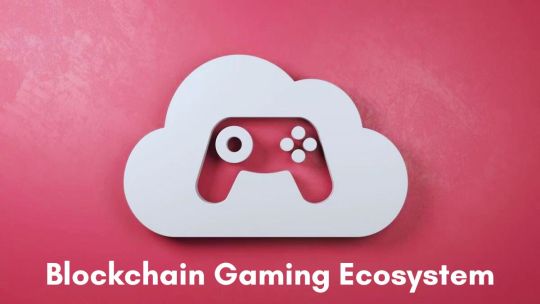
The idea of a blockchain gaming ecosystem has emerged in recent years as a result of the convergence of blockchain technology and gaming. Thanks to this creative approach to gaming, players now have new options for ownership, interoperability, and wealth creation. With an emphasis on blockchain game development services, in this blog, we will explore in detail what the blockchain gaming ecosystem is and how it affects gaming.
What is a Blockchain Gaming Ecosystem?
A blockchain gaming ecosystem refers to a network of interconnected games, platforms, and services built on blockchain technology. At its core, this ecosystem leverages the decentralized and immutable nature of blockchain to provide players with unique gaming experiences and opportunities for asset ownership and value creation.
In a blockchain gaming ecosystem, players can buy, sell, and trade in-game assets using digital tokens secured by blockchain technology. These assets can range from virtual currencies and items to unique collectibles known as non-fungible tokens (NFTs). Players have full ownership and control over these assets, allowing them to transfer them between games and even outside of the gaming ecosystem.
Key Components of a Blockchain Gaming Ecosystem
1. Games:
The backbone of any blockchain gaming ecosystem is, of course, the games themselves. These games are typically built on blockchain platforms like Ethereum or EOS and incorporate features such as digital scarcity, provable fairness, and asset interoperability.
2. Marketplaces:
Blockchain gaming ecosystems often include decentralized marketplaces where players can buy, sell, and trade in-game assets directly with each other. These marketplaces are powered by smart contracts, ensuring secure and transparent transactions.
3. Wallets:
To interact with the blockchain gaming ecosystem, players need a digital wallet to store and manage their assets. These wallets support the storage of various cryptocurrencies and tokens, as well as the seamless transfer of assets between games and platforms.
4. Blockchain Infrastructure:
Blockchain gaming ecosystems rely on a robust blockchain infrastructure to support their operations. This includes blockchain networks capable of handling high transaction volumes, as well as tools and protocols for scaling and interoperability.
Benefits of a Blockchain Gaming Ecosystem
- True Ownership:
In a blockchain gaming ecosystem, players have true ownership of their in-game assets, thanks to the transparency and security provided by blockchain technology.
- Interoperability:
Assets in a blockchain gaming ecosystem can be easily transferred between games and platforms, enabling greater interoperability and creating new opportunities for gameplay and value creation.
- Monetization:
By buying, selling, and exchanging game items for real money, players can earn money from their gaming experiences. This gives developers and players access to additional sources of revenue.
Role of Blockchain Game Development Services
Blockchain game development services play a crucial role in the creation and maintenance of blockchain gaming ecosystems. These services encompass everything from game design and development to smart contract development, wallet integration, and blockchain infrastructure management.
By partnering with experienced blockchain game development services, game developers can leverage the expertise and resources needed to build high-quality games that seamlessly integrate with the broader blockchain gaming ecosystem. This includes ensuring compatibility with existing blockchain standards and protocols, as well as optimizing for security, scalability, and user experience.
Conclusion
In conclusion, a blockchain gaming ecosystem represents a new paradigm in gaming, offering players unprecedented levels of ownership, interoperability, and value creation. With the support of blockchain game development services, developers can unlock the full potential of blockchain technology to create immersive gaming experiences that redefine the way we play and interact with digital assets. As the industry continues to evolve, we can expect to see even more innovation and growth in the blockchain gaming space, driving the future of gaming forward.
#blockchain game development#blockchain game development services#blockchain game development company
0 notes
Text
Exploring the World of Sports Game Betting Websites

All over the world, sports betting has long been a well-loved pastime for enthusiasts. The advent of internet platforms has made sports betting easier and more accessible than in the past. Today, we explore the world of sports betting websites and the influence of sports betting game development companies in this ever-growing sector of the economy.
The Rise of Sports Game Betting Websites
In recent years, sports game betting websites have grown in popularity as more people seek to add excitement to their sports-watching experience. These websites allow users to place bets on various sporting events, from football and basketball to cricket and tennis, all from the comfort of their homes. With sleek interfaces, real-time odds updates, and a variety of betting options, these platforms have transformed the way people engage with sports.
Sports Betting Game Development Companies: The Driving Force Behind Innovation
At the heart of every successful sports game betting website is a team of skilled developers and engineers working tirelessly to create an engaging and user-friendly experience. Sports betting game development companies play a crucial role in this process, leveraging cutting-edge technology to build platforms that meet the evolving needs of users.
These companies are responsible for designing intuitive interfaces, implementing secure payment systems, and ensuring seamless integration with live sports data feeds. By harnessing the power of data analytics and machine learning, they can provide users with personalized recommendations and real-time insights, enhancing the overall betting experience.
The Importance of Responsible Gambling
While sports game betting websites offer an exciting way to engage with sports, it's important to remember the risks involved. Responsible gambling practices should always be encouraged, with users setting limits on their betting activities and seeking help if needed. Sports betting game development companies have a responsibility to promote responsible gambling through features such as self-exclusion tools and information on gambling addiction support services.
The Future of Sports Game Betting Websites
As technology continues to advance, we can expect sports game betting websites to evolve and innovate at an even faster pace. From virtual reality betting experiences to blockchain-based betting platforms, the possibilities are endless. Sports betting game development companies will continue to play a pivotal role in shaping the future of sports betting, driving innovation and pushing the boundaries of what's possible.
Conclusion
Sports game betting websites have become an integral part of sports entertainment, offering fans an exciting way to engage with their favorite teams and players. With the expertise of sports betting game development companies, these platforms will continue to evolve, providing users with innovative features and unparalleled convenience. As the industry continues to grow, responsible gambling practices should always be prioritized, ensuring that everyone can enjoy the thrill of sports betting safely and responsibly.
0 notes
Text
Exploring the Legality and Potential of Sports Betting Game Development in India

The recent exponential rise of the global sports betting business is driven by legislative changes and technological advancements. With sports enjoying immense popularity in India, the prospect of creating sports betting websites has attracted considerable attention. However, prospective developers need to navigate the legal framework surrounding gambling activities in the country. Let's examine the legitimacy and potential of sports betting game development in India.
Understanding the Legal Landscape
In India, the legal status of sports betting is governed by various federal and state laws, including the Public Gambling Act of 1867. Under this archaic legislation, most forms of gambling, including sports betting, are prohibited. However, there are exceptions. States have the authority to enact their gambling laws, and several have legalized certain forms of gambling, such as horse racing and lotteries.
Additionally, the emergence of online betting platforms has raised complex legal questions. While the Public Gambling Act predates the Internet era, courts have interpreted its provisions to apply to online gambling activities. As a result, online sports betting remains a legally gray area in India, with no clear regulations governing its operation.
Despite the legal ambiguity, the popularity of sports betting persists, driven by offshore betting platforms and the proliferation of mobile betting apps. Recognizing the potential economic benefits, some states have initiated discussions on legalizing sports betting to regulate and capitalize on this lucrative market.
Opportunities for Sports Betting Game Development
Amidst the legal uncertainty, the demand for sports betting experiences in India continues to grow. Developing sports betting websites allows entrepreneurs and developers to tap into this burgeoning market. By leveraging innovative technologies and adhering to best practices, developers can create engaging and user-friendly platforms that cater to the preferences of Indian sports enthusiasts.
Key Considerations for Developers
For developers considering sports betting game development in India, several key considerations must be addressed:
1. Legal Compliance:
Prioritize legal compliance by thoroughly researching and understanding the applicable laws and regulations at both the federal and state levels. Consult legal experts to ensure that your platform adheres to the relevant legal requirements.
2. Payment Solutions:
Integrate secure and reliable payment solutions that facilitate seamless deposits and withdrawals for users. Consider partnering with payment service providers that support popular payment methods in India, such as UPI, wallets, and bank transfers.
3. User Experience:
Focus on delivering an exceptional user experience by designing intuitive interfaces, optimizing performance across devices, and offering a wide range of betting options on popular sports events.
4. Responsible Gaming:
Implement robust responsible gaming measures to promote safe and responsible betting practices among users. Provide tools for setting betting limits, self-exclusion options, and access to support resources for individuals experiencing gambling-related issues.
5. Data Security:
Prioritize data security and privacy by implementing industry-standard encryption protocols, secure authentication mechanisms, and regular security audits to safeguard user information and transactions.
Conclusion
While the legal status of sports betting in India remains uncertain, the potential for sports betting game development is undeniable. By navigating the legal landscape thoughtfully and adhering to best practices, developers can create innovative and engaging platforms that cater to the country's growing demand for sports betting experiences. With careful planning and execution, sports betting game development in India holds promise as a lucrative and exciting opportunity for developers and entrepreneurs alike.
0 notes